I was speaking to my friend Brooke the other day when the conversation quickly turned to one of our most frequent laments….selling horses.
The process of retraining thoroughbreds is quite near and dear to both of our hearts, and we quickly became friends through our journeys at the Retired Racehorse Projects Thoroughbred Makeover, a process that I have blogged often about.
And we admit that retraining these magnificent creatures has given us purpose, has strengthened our riding, and has opened doors to us that we never knew possible.
But as is life, if we are to continue to pay it forward to numerous other horses with our retraining, we are forced to sell or rehome the majority of those that we lay hands on, which allows us to open a stall and a place for the next steed to benefit from the process.
It is simple math – one in, and one out. But it also is what leads us into our least favorite aspect of the process: The Horse Sale.
And as we lament about the long messages answered, the tire kickers and the overzealous parents, the trials cancelled, and the ridiculous price negotiations, one other part of the process came up which annoyed us both.
The question that was asked time and time again. Over and over.
What exactly are you training him for?
Now Brooke and I both come from diverse worlds – she having grown up in the breed world riding in varying forms of tack, while I ran up the ranks of western disciplines, and added some rodeo, before we both became eventers.
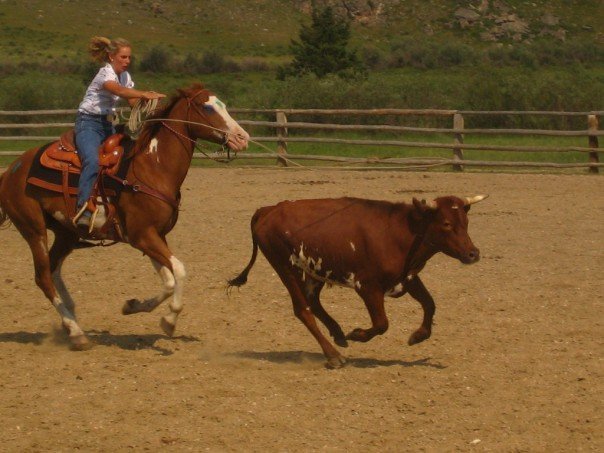
So while we appear as though to be simply eventers now, we are always perturbed and confused by the question. And maybe we are different. Maybe we are unique. Because we are not limited by the discipline in which we actively compete in, and therefore neither are our horses. So we both agreed…
We are not training for a DISCIPLINE.
We are training the horse for LIFE.
I may be considered simply an eventer, but I can guarantee that my exposure of that sales horse to a coop on the cross country course will benefit it in the hunters. I may be schooling dressage today, but I can guarantee you that those haunches in that I just taught this horse will help him in reining. And I may have just gone for a walk hack to check out the sights and scenes while cooling out, but you’ll thank me later if you ever want to do endurance.
And more importantly, I do not take on these horses thinking that they will all fit into my wheelhouse, and that was no more true than when I attempted to make Nixon an eventer that entire first year that he just wanted to dance in the sandbox.

Nixon just wanted to dance. Photo by Melissa Bauer-Herzog
But if you are truly good at this retraining business, and truly in it for the betterment of the horse, than you will quickly realize that the end goal isn’t that the horse fits your hopes and dream, but rather that your lifetime of education around these horses will allow that horse to have hopes and dreams of his own.
And I think of this each time that I get a horse, and begin this process over and over again.
What are the fundamentals? What can I teach this horse that is important?
And not important for eventing, or dressage, or hunters, or even western pleasure.
What are the fundamentals of simply riding?
It isn’t a piaffe or a puissance that will guarantee these horses a safer future. It isn’t a 10 on an extended trot, or a 1D barrel run. It isn’t rearing on command or laying down to be mounted.
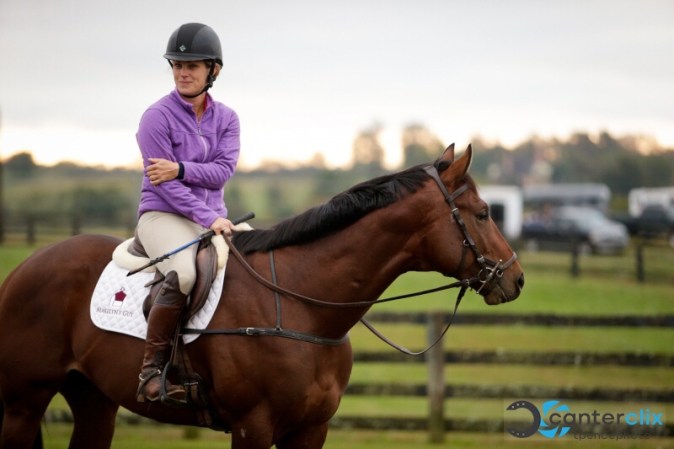
Training a horse to simply be a good horse. Photo by Taylor Pence
It is simply usability. Rideability. Trainability. Good manners and easiness to be around.
I don’t get on these horses and put them into a frame just because they look prettier in the sales pictures. I do it because it is teaching them to move off of my leg and accept contact on their mouth.
I don’t only road hack to take pictures of manicured stone walls with perky ears in between, I do it because it exposes them to being off property, seeing scary objects, and responding with the appropriate attitude.
I don’t work with the horses daily just to keep them tired, I do so because on a daily basis there is something else that they can be exposed to – whether it is at a walk or a gallop.
And I don’t ask them to learn anything that I wouldn’t expect from every horse. And this can be as simple as loading onto a trailer, or as complex as an in and out.
We as trainers or horsemen box these horses too quickly and too easily. And I admit that I have caught myself doing the same thing. I have gotten on that horse for their first ride and been sure that they will end up a hunter simply because of how they move, only to realize two months later just how far from the truth that can be as they see their first XC fence. I have watched horses move in the field and assumed they will be superb in dressage, only to realize after popping over a crossrail just how much they love jumping. And I have free jumped horses who have unlimited scope, only to watch them revolt once fillers are added and a human swings on.
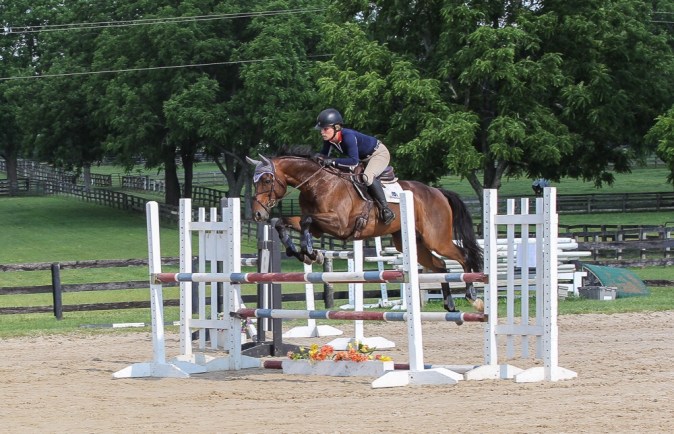
Everyone thinks Mak should be a hunter…
And that is why my strategy for this crazy game of retraining these thoroughbreds is more simple. Less quarantined. More open.
Remove my expectations from the equation.
Remove my bias from the equation.
And train usable skills.
Skills as simple as calmly assessing new situations. Being ridden alone or in a group. And even ground manners.
And skills that may seem advanced or of a single discipline, but are truly applicable across the board. Moving off of the riders leg. Accepting contact. Being exposed to foreign places and foreign concepts. Adjustability.
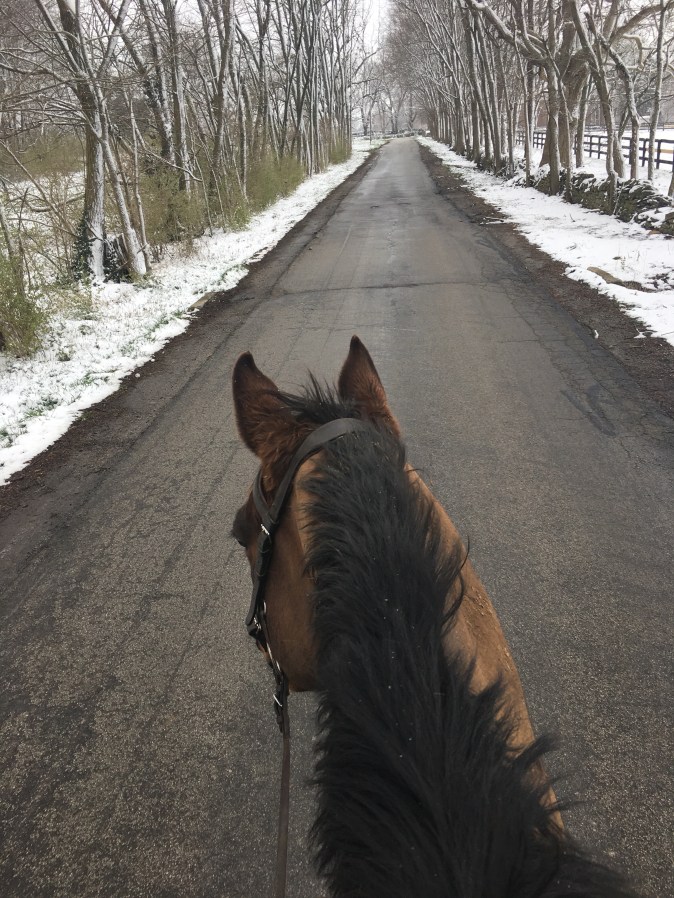
Road hacking my eventers to increase bravery.
I am not training the horse to utilize those skills simply to be an eventer, they are just the things that I have found lead to success in eventing. But in exchange, none of these skills will take away from the training for future success in any other arena, and they all can enhance that process.
You can lengthen the stride across the diagonal in a dressage test at the preliminary level of eventing, but you also lengthen the stride of the canter as you see your distance in the hunters. You ask your horse to do shoulder-in at second level of dressage, but you also need that shoulder-in as you round the barrel of your pattern. And you ask for adjustability in the canter to put a 5 in a 6 stride line in the jumper ring, but you also constrict and contract that stride as you charge the ball in polo.
And you need a distance, a tempo, bravery, and a lead change whether you are doing hunters, jumpers, eventing, foxhunting, or anything else requiring a fence.
So no, we do not need to specify that we are training that horse to be a hunter. And in contrast, we do not need to specify that we are training them to event.
Especially not during those pivotal first few months.
Instead, we need to focus on training them for life.
Those life skills that are needed for all disciplines, and all horses. Skills that are translatable and useful.
By getting out of our own heads, out of our own worlds, and out of our own comfort zones, we can then truly put the horse first. And by putting the horse first, we open a whole new world of opportunities. These opportunities might make us feel as though we are teaching our horses more. Broadening their education and therefore both their ability in addition to their price. But at the end of the day, maybe these opportunities are truly their to train us. To open our eyes and allow us to fully understand what equestrianism is. What horsemanship is.
And when that happens, we all benefit. Us, and the horses that brought us here.
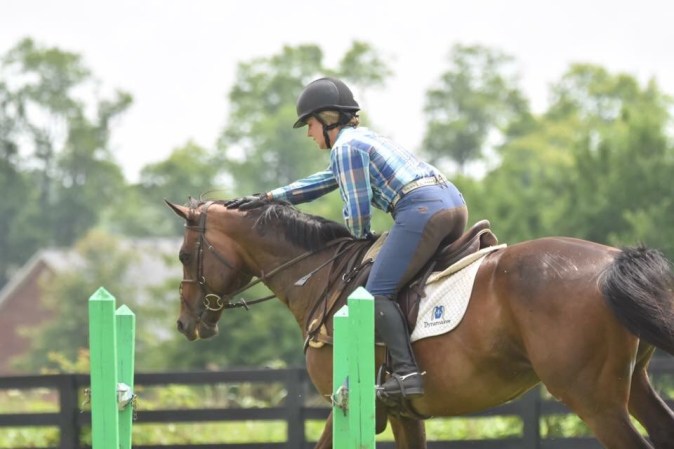
Photo by JJ Sillman.
AMEN. I firmly believe that more trainers, and more riders themselves, need to take this approach.
Powerful. If I ever find myself horse shopping again you will be the first person I speak with
I love this post. I recently sent my OTTB to Ocala for some event training with an UL rider. It wasn’t my plan but hers, not because I can’t ride him well, but because we both agreed that his athletic ability supersedes my goals and I told her that I wanted him to have VALUE. Not monetary value, but value in the horse world, so if say, I get too busy with life and want to lease him for a bit he has value outside of what my myopic world view for him. In addition, I want him to go and see and do ALL THE THINGS. While the opportunity sort of fell into my lap, what kind of horse owner would I be to demand he sit in freezing temps in a sacrifice paddock and be stuck in the indoor for months when he could be off having serious adventures (neither is wrong per se)? It stings having him away, but I am excited for the horse he is becoming and the experiences that will shape him for a lifetime (especially at the beginning of his 6th year). And, all of the life skills he’s acquiring will help him become the solid partner I need as a weenie, adult amateur.
I couldn’t agree with you more! So many skills a horse learns can be used in any discipline. One example I’ve experienced is being on a trail ride on a spooky warmblood and using a shoulder in to help keep the horse supple and prevent the spook from becoming a blowup. Basic dressage was our focus when doing ring work so it was familiar to him and helped him relax when out in an open field. It’s so true that we should not be fixated on one discipline when training horses and that we should listen to them to help find what they excel best at.
I will comment later when I have time.
I completely agree!